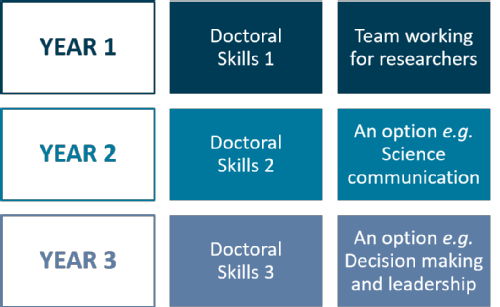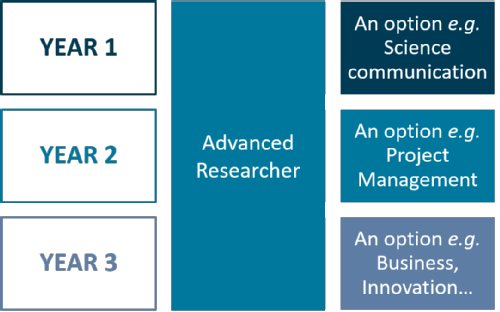Resources for staff
The programme
Effective transferable skills training for Warwick’s postgraduate and postdoctoral researchers is essential to our success in producing not just good but excellent researchers and future employees.

Warwick’s PGCTSS has been developed as the only academically accredited and developed course of its kind in the UK (and as far as we know internationally) and several UK universities are now following suit with similarly formalised programmes for their graduates. The programme is appropriate for Science and non-clinical medicine. The PGCTSS has been developed in consultation with the students, industry and bodies such as the EPSRC and the learned societies. It is anchored in the current training and future career needs of students and post-doctoral researchers. The programme has systematically expanded over the past 15 years and currently has ~900 PhD students and some post-doctoral researchers registered. Warwick Researcher Development Framework (RDF) is aligned with the structure of the PGCTSS and as such, students completing the Certificate fulfil the recommended training requirements.
The well-developed skill training programme in the faculty is crucial to the continued success of our faculty in securing training grants: including DTCs, CDTs, Initial Training Networks (ITN) and other doctoral training partnerships. Additionally, a number of charter marks and benchmarks, including Athena SWAN and HR Excellence in Research Award, require an ongoing commitment to researcher and staff training, which PGCTSS helps to fulfil.
The evidence gathered from graduates of the programme shows that PGCTSS graduates are on average 8% more likely to be in full-time employment after graduation, compared with the SEM faculty average.
Programme aims
The main aims of the PGCTSS are:
- To increase research effectiveness by developing research related skills
- To prepare researchers for future roles as senior scientists and team leaders
- To develop the skills to allow the researcher to exercise responsibility for, and leadership of, their research and exploring these skills in a variety of settings.
Programme structure
The Postgraduate Certificate in Transferable Skills in Science for researchers is a 60 CATS certificate composed of a number of modules that help the scientist to identify and gain core skills for a career in science. The structure of the Certificate follows the schemes below:
|
Doctoral Researchers |
Postdoctoral Researchers |
 |
 |
Time commitment
The programme is designed to be integrated into PhD students' life without creating a lot of additional workload, while creating opportunities for training, networking and reflection.
The Doctoral Skills portfolio modules focus on gathering evidence of developmental activities that students should be completing naturally during different stages of their PhD journey e.g. progress reports, attending conferences/meetings, presenting their own work, engaging with literature etc.
The optional modules usually require approximately 3 days of course-work, with an additional follow-up task which is usually integrated in the PhD activities, examples of follow-up tasks include e.g. outreach/teaching activities, presenting during a conference, preparing a research website/profile, preparing a project plan for the remained for of the PhD, etc.
PGCTSS fulfils the University and UKRI requirementLink opens in a new window for each PhD student to spend a minimum of ten days on professional development and skills activity in each year of their PhD.
Supervisors contribution
In order to pass each module researchers are asked to complete a series of tasks and document their progress in a skills development portfolio. Supervisors are asked to occasionally review student's progress and sign tasks off as complete. We ask supervisors to use their own judgement in order to assess if each task has been completed to a level expected of a graduate student in your discipline.
Example tasks
- Doctoral Skills 1 - Year 1 research plan
- Supervisor's contribution might include feedback on the research plan or just a confirmation that the plan was reviewed during the PhD progression/advisory committee meetings. Student might wish to include the feedback received during the advisory meeting as additional evidence.
- Doctoral Skills 2 - 1 page seminar review for a general reader
- Supervisor's contribution might include feedback on the review or a confirmation that the review is pitched at a right level for a lay reader and shows good understanding of the the key issues raised.
- Doctoral Skills 2 - Poster or Oral presentation
- Supervisor's contribution might included feedback on the presentation/poster or a confirmation that the presentation took place during an event where student had an opportunity to receive feedback on their work (e.g. a departmental symposium). Student might wish to include the feedback received during the event as additional evidence.
- Doctoral Skills 3 - Ethical principles - students is asked to summarise ethical issues relevant to their field and project, this might include use of data, real world applications of the research, publication and attribution of research, etc.
- Supervisor's contribution might include feedback on whether all the ethical issues surrounding student's project have been considered and addressed appropriately
Additional resources
Post Graduate Certificate in Transferable Skills PGR induction talk (2024)
SkillsForge Quick User Guide for Doctoral Skills Module (DSM) Approvers
SkillsForge Quick User Guide for Supervisors and DGS
Course Codes
TCHA-F1PC – PG Certificate in Transferable Skills in Science
TCHA-F1PD – PG Award in Transferable Skills in Science
TCHA-F1PH - PG Certificate in Transferable Skills in Science for Postdoctoral Researchers
TCHA-F1PJ – PG Award in Transferable Skills in Science for Postdoctoral Researchers.
If you have any queries contact Louise Hockenhull (transferable.skills@warwick.ac.uk) or Course Director Dr Daniel Franklin (Daniel.Franklin@warwick.ac.uk).
